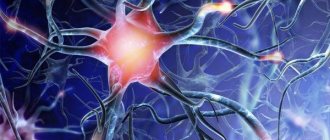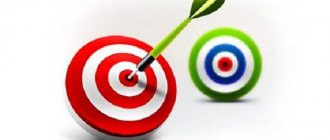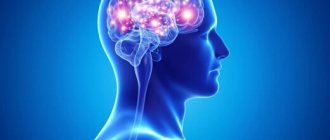According to Wikipedia, self-control is the ability to control your emotions, thoughts and behavior. It is based on will - the highest mental function that determines a person’s ability to make conscious decisions and implement them.
This video explains why self-control is more important than motivation and how it can be developed.
Is it possible to train self-control? Self-control can be trained and improved, like many mental processes. This requires specific methods and strategies that will help you resist or avoid temptation. Yes, these are two fundamentally different ways. The first is considered hardcore, effective and incredibly difficult to implement. The second is perceived by many as weakness, because how can you train willpower and self-control if you simply avoid temptations? But it is both methods in combination that work perfectly.
Types of control
A person involved in sports or physical activity can control himself, thanks to which he will know whether the effect is beneficial. Self-control during physical education is possible in the following varieties.
- Analysis of subjective and objective parameters.
- By external and internal signs.
- A person keeps a self-control diary.
- They monitor their well-being in the form of their general condition, which is supplemented by the support of a physician and a teacher.
Objective and subjective methods
Self-control during physical exercise based on subjective parameters includes the following signs:
- well-being;
- emotional mood;
- comfort;
- presence of appetite.
Objective parameters:
- pulse or heart rate (heart rate);
- arterial pressure;
- body weight and volumes;
- digestive work;
- sweating;
- vital capacity of the lungs (VC);
- muscular strength;
- dynamic parameters;
- achievements, effectiveness.
Observation is also carried out based on external and internal signs. The first include the amount of sweating, skin color, coordination of movements, and breathing rhythms. If you are overloaded, you may experience shortness of breath, blueness near the lips, redness of the body, and loss of coordination. In this case, take a rest and stop exercising. Internal indicators of fatigue: muscle pain, nausea, dizziness. With such signs, the training is stopped altogether. If a person successfully overcomes the load, his appetite, sleep, mood, and general well-being improves.
Athlete self-control
Every athlete needs systematic self-control. This will allow us to assess the loads, development, and track the dynamics of changes. At the same time, the trainer receives data on the effectiveness of the stages and methods used. The results are usually reflected in a notebook with a standard design for self-control. The general condition is rated: bad, satisfactory, good.
To help the athlete and coach, there are methodological publications that cover psychological self-training. For example, Alexey Ivanov’s book “Psychology of a Champion. An athlete’s work on himself,” which helps to cultivate the psychology of a champion. The book will help both beginners and experienced athletes overcome “pre-race fever” and develop self-control.
The correct training orientation is:
- absence of physiological abnormalities;
- comfortable condition;
- performance.
The diary contains data on sleep parameters and performance, which cannot be reduced. Otherwise, the situation is reported to the coach or doctor. Deviations in the mode, data on intensity and how the load was transferred are recorded. The pulse rate value is checked several times a day, indicating the number of beats per minute.
Definition
Control can be internal - directed at oneself, or external - regulating the activities of others. When control mechanisms are aimed at analyzing and regulating one’s “I”, this process is called the discipline of self-control.
It is one of the indispensable factors of a person’s self-awareness and is a condition for adequate perception of the internal and surrounding world.
The following types of self-control are distinguished:
- temporal;
- spatial;
- arbitrary.
The temporary type is divided into preceding, current and effective subtypes, combining a preliminary assessment of the process, control of the action itself and analysis of the results of the action.
Are you ready to stop thinking about your problem and finally move on to real actions that will help you get rid of your problems once and for all? Then perhaps you will be interested in this article .
Spatial self-control regulates the difference between perceptual modal channels. It is divided into auditory, tactile and visual.
The type of self-control of an arbitrary type regulates variables that are not expressed by a constant: emotions, psyche, thinking.
Proper nutrition to stay fit
Diet and a balanced menu are the most important factors that require constant attention. To maintain physical fitness, you need to follow a proper diet. If you can’t work out the menu on your own, then specialist nutritionists and a convenient service for athletes and others are at your service.
For those who conduct independent training
Not only athletes train, but also people who want to stay in shape. Some prefer running for health, others prefer gymnastics. It is recommended to record self-monitoring data in a diary, but it is somewhat different from that of an athlete. Namely, it reflects not only the results and reactions of the body, but also information about quiet periods. Self-control allows you to cultivate not only self-discipline, but also other positive human qualities.
Control over the functioning of blood vessels and the heart
When enduring sports physical activity, you need to monitor your general condition. After all, this is the response of the functions of organs and systems to the activation of muscle work. Particularly important is the change in parameters of breathing, cardiac and vascular systems. Performance mainly depends on heart rate (HR).
What is the significance in a person’s life?
How to manipulate people - can this be learned, methods of influence
The complex skill of self-control is necessary for a modern person not only for a successful career. It will be useful in everyday and life situations. For example, to prevent conflicts with your loved ones, talk with children without irritation and anger, so as not to explode with emotions when communicating with neighbors. In short, the ability to find one’s place in society and the desire to have adequate self-esteem are achieved through self-control.
The skill is considered extremely useful, as it helps to develop a number of positive qualities. Any activity requires concentration and consistency, the ability not to deviate from your goals. All this is impossible without volitional efforts and control over them.
Self-control is an important quality of self-control in modern man
You can briefly evaluate what the meaning of self-control is as follows:
- develops determination and the ability to manage emotions;
- contributes to the correct assessment of real situations and changing them in one’s favor;
- allows you to extinguish emotions at the right time, control your feelings and mind;
- helps common sense prevail over emotions.
Other indicators of physiological development
Other parameters of the development of human physiology include the following values.
- Chest volume. Self-monitoring includes its measurement during inhalation and exhalation in a calm state. The difference is called excursion and depends on the type of breathing and how developed the muscles are.
- The strength of the arm muscles is determined by a dynamometer. This value is related to the previous one, as well as to the person’s weight and other parameters. For men this is from 60 to 70% of body weight, and for women - up to 45%.
- Deadlift muscle strength (back extensor muscles), which is influenced by gender, age, body weight and profession.
- Spirometry. The volume exhaled from the lungs (VC) is measured.
METHODS OF SELF-CONTROL OF THE FUNCTIONAL STATE OF THE BODY
Function evaluation is possible thanks to the following methods.
- Monitoring heart rate is a simple way to reflect the activity of the heart and blood vessels. The average person's pulse ranges from 60 to 80 beats/minute. The minimum is usually discovered in the morning.
- Pulse rhythm. Or arrhythmia, indicating respiratory dysfunction (more often when inhaling, and less often when exhaling), which is considered normal, or excessive stress.
- The breathing rate is determined taking into account age, level of physical fitness, and training intensity.
Changes in the circulatory and respiratory systems are especially important. They play a decisive role in admission to classes or competitions. But they also pay attention to blood pressure. Deviations from the norm are considered indicators from 130 to 80 mm Hg. and higher, indicating hypertensive conditions. If the numbers are below 100 by 60 mm Hg. Art., hypotension is established.
At Kerdo’s initiative, a formula with the index of the same name (IC) appeared. The norm is calculated from it using the ratio: IR=D/P, where:
- D—minimum pressure;
- P - pulse.
It is a known fact: the norms for minimum blood pressure and pulse are numerically the same. That is, for a person without disorders, the index is approximately equal to one. If there is a deviation in the functioning of the cardiovascular system, the numerical value turns out to be greater or less. Such failures are caused by improper nervous regulation.
They also independently monitor physical development: height, weight, chest circumference, taking measurements.
Set high goals
It's so easy to sit on YouTube and watch funny videos... You find time for that! In any case, you must prioritize and determine the most important activities for yourself.
When you are full of doubts and your level of self-control is approaching zero, understanding what really matters to you can save the situation. Of course, even knowing about an important project, you may begin to procrastinate, but deep inside you know that what you are doing is much more important than the moment of comfort that procrastination will provide you with.
Determine your most important goals in different areas of your life: health, well-being, relationships.
If you love chocolate and set yourself a goal to lose 5 kilograms of excess weight, then you understand that the short rush of dopamine from eating your favorite sweet is not more important than your goal.
Of course, this doesn't mean that you will be protected from all your bad habits just by setting goals for yourself. Remember: there will be no quick changes, you will have a long process of working on yourself. But every time you remind yourself of your end goal, it becomes a little easier to pursue it.
Since we're talking about food, here's a simple rule that's very easy to follow. However, it is just as easy to ignore.
SELF-CONTROL DIARY
When engaging in physical education and various sports, information is recorded in a self-control diary. Performance, emotions, sleep, appetite are taken into account. Pulse and other objective characteristics are measured. If, as a result of keeping a log, significant discomfort, fatigue, or pain are revealed, the exercises are stopped. Further adjustments are prescribed by specialists: a doctor, a trainer.
Self-monitoring of those involved in physical exercises and sports helps in calculating loads. This factor takes into account the degree of preparedness and age. But if sleep or appetite becomes worse, workload and intensity are reduced. And in case of further discrepancies with health standards, a consultation or examination by a doctor is recommended.
So, systematic record keeping is practiced as self-control when engaging in physical exercises and sports for the following purposes.
- Accounting for classes.
- Reflection of changes.
- Recording functional tests.
- Checking preparedness.
- Study of motor patterns over a week.
The recordings are used to evaluate the effect of training. They reflect the methods of self-control during physical exercise and the means used. As a result of written recording of indicators, planned calculation of training intensity and optimization of alternating intervals of activity and rest are possible. The diary shows whether the regime is being followed.
Methods for determining load based on pulse and respiratory rate readings
The basics of self-control during physical exercise and various sports include pulse and breathing rhythms as objective values. Heart rate is a particularly reliable number that reflects how the heart responds to stress. It is determined by the number of beats per interval: minute, 10 seconds. The test is carried out at rest and after active work. The degree of fitness of a person is determined by the percentage increase in heart rate. In this case, the resting frequency is taken as 100%. For example, if 12 heart beats are recorded in 10 seconds of a calm state, and 20 after exercise, then the rate of acceleration is 67%.
Self-control in the process of physical education also involves assessing respiratory function. When exercising, a person consumes more oxygen, which goes to supply the muscles and brain. The respiratory rate can indicate its magnitude, normally taking a value from 16 to 18 times per minute. Vital vital capacity is another important parameter. This is the volume at maximum exhalation after the same extremely large inhalation. Measured in liters, this figure depends on age, gender, body size and physical fitness. The average value is from 3.5 to 5.0 liters in males and from 2.5 to 4.0 in females.
Characteristics and description of the process
Self-control in psychology is, according to the American-Israeli psychologist D. Kineman, a system that ensures the functioning of the human psyche and the concentration of attention required for conscious mental actions.
According to the psychologist, self-control:
- is an integral part of self-development;
- contributes to the achievement of a person’s goals;
- helps get rid of bad habits and assists in the formation of new attachments.
D. Kineman also put into the concept of “self-control” - helping a person maintain commitment in stressful situations, as well as one of the ways to deal with various psychological problems. Thanks to self-control, an individual can more easily endure difficulties, physical, psychological and intellectual stress.
In 1960, the American psychologist W. Michel conducted a “marshmallow test” among young children, during which each child received a piece of dessert and was punished not to think about its taste and sweetness.
The child was offered 2 options:
- sit down a piece of marshmallow immediately;
- wait 15 minutes and get another part of the dessert.
For the next 40 years, the psychologist carefully monitored the lives of the experiment participants and came to the conclusion that children who succumbed to temptation and ate their piece of marshmallow right away faced many emotional and psychological problems in adulthood much more often than those who, using self-control, overcame the initial temptation .
Generalized definition of the term Doctor of Psychological Sciences, Professor A.A. Krylov gives from the position of a functional approach to it, based on the fact that the object of self-control, regardless of the sphere of mental phenomena, always has a testing character, carried out in the process of comparing it with a standard that already actually takes place in the real world.
Self-control in psychology is based on the following concepts:
- The Yerkes-Dodson Law, based on the formation of results under the influence of different motivational levels. According to this theory, a high motivational level is only suitable for achieving short-term results and small goals.
- The need-information theory of emotions, according to which low motivation is the key to achieving a desired but difficult to achieve goal, since the longer a person moves towards the desired result, the stronger the emotional overstrain increases, leading to a state of stress and loss of the ability to think rationally.
According to psychologists, in most cases these two phenomena are interconnected, being a major part of self-control.
Medical supervision
Self-control in the process of physical education is complemented by medical, including a comprehensive examination of functions. Why is this necessary? The goal is to study the consequences of loads received in physical education classes. Thus, in universities every year, 3 medical groups of students are identified through examination.
- The main one has almost no deviations. These persons can participate in competitions without restrictions and perform all programs.
- Preparatory, with satisfactory development and condition. Here the load increases gradually.
- Persons from the special group were found to have chronic diseases, illnesses, and developmental disabilities. They study according to a special program after consulting a doctor or physical education teacher.
Athletes undergo such examinations twice a year.
Examples from literature
Perhaps, in literary works there are a lot of vivid visual plots where the hero developed his will, improved himself, or, conversely, fell into self-destruction. Such examples are most often found in fiction, the basis of which is the struggle with oneself.
For example, it is very noticeable in Ivan Goncharov’s work “Oblomov” that the two main characters are opposites to each other: Stolz is full of self-control, but his friend Oblomov could not find the core and energy in himself.
Correction of the content of physical exercises and sports based on control results
As a result of observations, it turned out that a third of the athletes required medical adjustments. And up to 20% - correction of the training process. For example, it is necessary to increase aerobic and speed capabilities and endurance. Or increasing rest periods is recommended. As well as a temporary decrease in the volume and intensity of the load. Measures are taken based on pulse values, breathing status, blood pressure, and other parameters. So, if you are overworked or injured, reduce the number of workouts. The rest period should be such that the original performance can be fully restored.
If the training regimen is not adjusted, the student may experience serious impairments. These are pain in the heart, arrhythmia, increased blood pressure. Training will be stopped for a longer period and medical assistance will be required. When recovering, you will have to start with minimal loads in the rehabilitation mode. Individualization and optimization of sports activities are the key to its effectiveness while eliminating harm.
Act despite the discomfort
The things that you will benefit from in the long run are quite difficult to do at first. For example, when you just switch to a healthy diet, you don’t feel the best, but in the long term, giving up junk food is very important for your body.
Remember: it’s only difficult at the beginning of the journey. Your mind wants to stay in your comfort zone, but it is getting out of that zone that helps change your life for the better.
So with any process that brings positive results. For example, to write an article and receive a flood of gratitude from readers, you will have to agonize over the title, erase and write the beginning five times, and walk a couple of kilometers around the room before inspiration descends on you.











